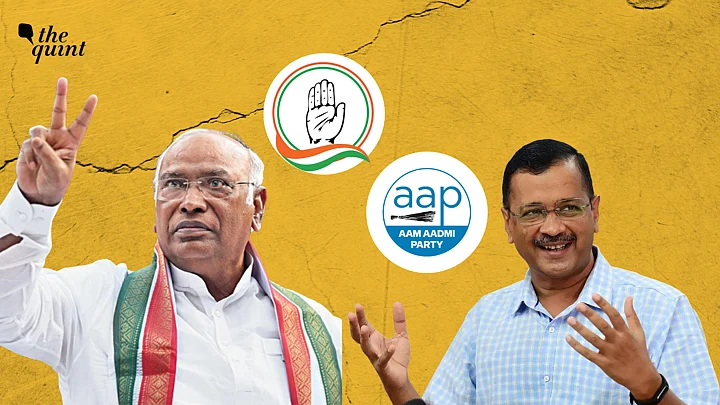Both the Congress and the Aam Aadmi Party described their first round of seat-sharing talks on 8 January as "positive" and "productive".
The meeting was attended by Mukul Wasnik, Ashok Gehlot, Mohan Prakash and Salman Khurshid from the Congress side, while Sandeep Pathak, Atishi and Saurabh Bhardwaj were present from AAP.
Addressing the media after the meeting, Congress general secretary Mukul Wasnik said, "Everything was discussed in detail. We will fight the elections together and give a befitting reply to the BJP".
This is part of the INDIA bloc's efforts to have a pre-poll alliance ahead of the 2024 Lok Sabha elections.
However, it won't be easy to arrive at a seat sharing arrangement between the two parties for a number of reasons.
What is the Scope of the Alliance?
AAP sources say that the scope of the alliance would cover five states:
Punjab: 13 seats
Delhi: 7 seats
Gujarat: 26 seats
Goa: 2 seats
Haryana: 10 seats
In addition to these, the negotiations could also cover the Chandigarh Lok Sabha seat.
Sources say that AAP is willing to concede space in Delhi and Punjab, where it has state governments, provided the Congress accommodates it in Haryana, Gujarat and Goa.
Congress insiders say that while they don't mind giving a seat to AAP in Gujarat, accommodating it in Goa and Haryana is going to be difficult.
"What is their presence in Haryana? They don't have even an Assembly seat here," a Congress leader from Haryana told The Quint.
"They want to become a player in Haryana by piggy-backing on the Congress," the leader added.
The Congress fancies its chances of dislodging the BJP-JJP alliance in Haryana in the Assembly polls later this year on its own might and doesn't want AAP to emerge as a competitor.
What is the Criteria for Seat-Sharing?
The other issue is on what the criteria should be for seat-sharing. Should it be the performance in the 2019 Lok Sabha elections or the performance in the last Assembly elections?
If it is the former, then the Congress will have the upper hand in negotiations as it won 8 out of 13 seats in Punjab, 1 out of 2 in Goa and stood second in 5 out of 7 seats in Delhi.
However, if it is the Assembly elections then AAP will have the upper hand as it had swept the Vidhan Sabha polls in Delhi in 2020 and Punjab in 2022.
Those privy to the negotiations say that they will strike a balance that is mutually acceptable to both parties.
Congress State Units Opposed to the Alliance
Both the Delhi and Punjab units of the Congress are opposed to any tie-up with AAP. They argue that the base of AAP and Congress is similar and by aligning with the former, the Congress will end up strengthening it and weakening itself. Ideologically also, both are broadly centrist parties with a strong thrust on welfarism.
In Delhi, at the Vidhan Sabha level, the Congress vote shifted almost entirely to AAP. The state unit argues that this wouldn't have been as smooth had the Congress not formed a post-poll alliance with AAP in 2013.
It Could be Counter-Productive in Punjab
AAP and Congress put together had around 65 percent of the total vote share in Punjab in the 2022 Assembly elections. The Congress is the main Opposition party in the state and the cadres of the two parties have a bitter rivalry on the ground. .
If they come together, it is possible that it opens the space up for the Akalis to occupy the Opposition space. As it is, it has been accusing both AAP and Congress of being Delhi-run parties and claiming that it is the only purely Punjabi party.
Given the intense rivalry between AAP and Congress local leaders and cadres on the ground in Punjab, it is not clear whether vote transfer will be smooth between the two parties.
AAP and Congress can actually afford friendly fights in Punjab in the Lok Sabha elections because the BJP is not a strong player in the state especially given Sikh voters' lukewarm response to the party.
It has a competitive chance in only about 3 out of 13 seats and even these won't be that easy without an alliance with the Akalis.
So is an Alliance Possible at All?
The above concerns don't mean that there is no scope of an alliance between the two parties.
The easiest state for the two parties to form a pre-poll alliance is, ironically, Delhi. This is despite the Delhi Congress' aversion to AAP.
This is because the BJP secured over 50 percent votes in all seven Lok Sabha seats in 2019, giving it an unbeatable lead. Even if AAP and Congress had contested together, they wouldn't have been able to defeat the BJP then.
The BJP's dominance in Delhi actually gives the two parties a reason to come together. If they choose their candidates well, transfer votes effectively and win over a chunk of BJP voters, the alliance may have a competitive chance in a few seats.
The same holds true for Gujarat. The BJP currently seems unbeatable but perhaps an alliance between Congress and AAP and a small swing in their favour could make a seat or two competitive.
Even in Punjab, there may be some scope for adjustment in a few seats. For instance, AAP is clearly the stronger party on the ground in seats like Sangrur and Bathinda. Even Patiala now, with Captain Amarinder Singh and Preneet Kaur no longer in the Congress. On the other hand, Congress may be a stronger challenger to the BJP in Gurdaspur and Hoshiarpur.
